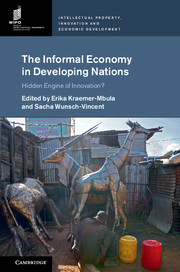Crossref Citations
This Book has been
cited by the following publications. This list is generated based on data provided by Crossref.
Sharma, Gautam
and
Kumar, Hemant
2018.
Intellectual property rights and informal sector innovations: Exploring grassroots innovations in India.
The Journal of World Intellectual Property,
Vol. 21,
Issue. 3-4,
p.
123.
Casanova, Lourdes
Cornelius, Peter Klaus
and
Dutta, Soumitra
2018.
Financing Entrepreneurship and Innovation in Emerging Markets.
p.
31.
Sheikh, Fayaz Ahmad
2019.
Undervaluation of informal sector innovations: Making a case for revisiting methodology.
African Journal of Science, Technology, Innovation and Development,
Vol. 11,
Issue. 4,
p.
505.
Ordway, Elsa M.
Naylor, Rosamond L.
Nkongho, Raymond N.
and
Lambin, Eric F.
2019.
Oil palm expansion and deforestation in Southwest Cameroon associated with proliferation of informal mills.
Nature Communications,
Vol. 10,
Issue. 1,
Sheikh, Fayaz Ahmad
and
Bhaduri, Saradindu
2020.
Grassroots innovations in the informal economy: insights from value theory.
Oxford Development Studies,
Vol. 48,
Issue. 1,
p.
85.
Oguamanam, Chidi
2020.
Nollywood phenomenon: “The Nollywood phenomenon: Innovation, openness, and technological opportunism in the modeling of successful African entrepreneurship”.
The Journal of World Intellectual Property,
Vol. 23,
Issue. 3-4,
p.
518.
Fu, Xiaolan
2020.
Innovation under the Radar.
Agwanda, Billy
Dagba, Gershon
Opoku, Prince
Amankwa, Mark Opoku
and
Nyadera, Israel Nyaburi
2021.
Sub-Sahara Africa and the COVID-19 Pandemic: Reflecting on Challenges and Recovery Opportunities.
Journal of Developing Societies,
Vol. 37,
Issue. 4,
p.
502.
Adesida, Olugbenga
Karuri-Sebina, Geci
and
Kraemer-Mbula, Erika
2021.
Special Issue: Can innovation address Africa’s challenges?.
African Journal of Science, Technology, Innovation and Development,
Vol. 13,
Issue. 7,
p.
779.
Jyoti Francis, Deep
and
Bhaduri, Saradindu
2021.
Intellectual property rights, social values, and innovation: a cross-country simultaneous equations model.
Economics of Innovation and New Technology,
Vol. 30,
Issue. 3,
p.
295.
Cozzens, Susan E.
2021.
Inequalities and STI policies: impact analysis.
Innovation and Development,
Vol. 11,
Issue. 2-3,
p.
229.
Guibrunet, Louise
2021.
The interplay of tacit and explicit knowledge in the informal economy: the atypical case of a recycling family business in Mexico City.
International Development Planning Review,
Vol. 43,
Issue. 1,
p.
13.
Sheikh ⶁ, Fayaz Ahmad
and
Bhaduri, Saradindu
2021.
Policy space for informal sector grassroots innovations: towards a ‘bottom-up’ narrative.
International Development Planning Review,
Vol. 43,
Issue. 1,
p.
115.
Blanton, Robert G.
and
Peksen, Dursun
2021.
A Global Analysis of Financial Crises and the Growth of Informal Economic Activity.
Social Science Quarterly,
Vol. 102,
Issue. 4,
p.
1947.
Daniels, Chux
and
Dosso, Mafini
2021.
Entrepreneurship, Technology Commercialisation, and Innovation Policy in Africa.
p.
279.
Fahmi, Fikri Zul
Ramadhani, Dinar
Dwicahyani, Aliyah Alfianda
and
Aritenang, Adiwan Fahlan
2021.
Informality and the branding of creative places: the case of Suci screen-printing kampong in Bandung, Indonesia.
International Development Planning Review,
Vol. 43,
Issue. 1,
p.
89.
Shekar, K Chandra
and
Joseph, K J
2022.
Determinants of innovation and interactive learning in informal manufacturing enterprises in India.
Science and Public Policy,
Vol. 49,
Issue. 3,
p.
427.
Dosso, Mafini
Kleibrink, Alexander
and
Matusiak, Monika
2022.
Smart specialisation strategies in sub-Saharan Africa: Opportunities, challenges and initial mapping for Côte d’Ivoire.
African Journal of Science, Technology, Innovation and Development,
Vol. 14,
Issue. 1,
p.
121.
Morais, Jandira
Corder, Glen
Golev, Artem
Lawson, Lynda
and
Ali, Saleem
2022.
Global review of human waste-picking and its contribution to poverty alleviation and a circular economy.
Environmental Research Letters,
Vol. 17,
Issue. 6,
p.
063002.
Sharma, Gautam
2022.
Analyzing the grassroots innovation process in India from a design perspective.
African Journal of Science, Technology, Innovation and Development,
Vol. 14,
Issue. 6,
p.
1677.



